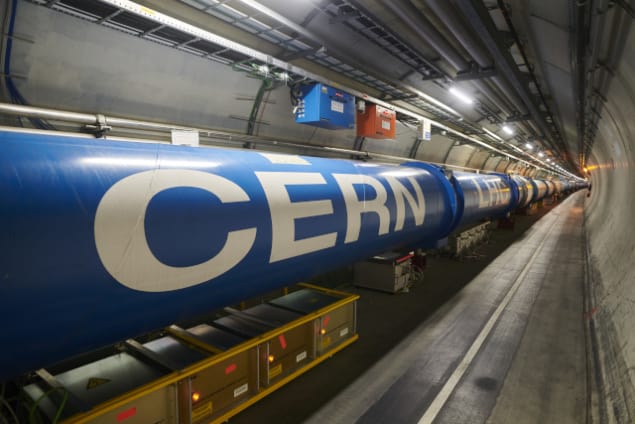CERN slashes experiment time next year by 20% as energy costs bite
12 Oct 2022
Shutting down: Operations at the CERN particle-physics lab will be curtailed by 20% next year to save energy (courtesy: CERN)
The CERN particle-physics lab near Geneva will be reducing the planned operation of its accelerator complex by 20% next year. The lab says the cuts are a response to the energy supply and cost crisis gripping Europe and the rest of the world. CERN will also stop experiments this year at the end of November – two weeks earlier than initially planned.
CERN buys around 70–75% of its electricity needs at the French regulated tariff Accès Régulé à l’Electricité Nucléaire Historique (ARENH). When all accelerators are operated for physics including the Large Hadron Collider (LHC), CERN’s total power consumption is about 185 MW, with the LHC infrastructure alone requiring about 100 MW.
To avoid winter blackouts, France has launched a national plan to cut energy consumption by 10% over the next few years. CERN has also been working with Électricité de France (EDF) on plans to reduce power to help the French electricity supplier cope with possible supply and demand issues over the winter months.
Mike Lamont, CERN’s director for accelerators and technology, told Physics World that as a large industrial consumer of electricity, CERN feels its social responsibility. At the end of the year, CERN usually runs a few weeks of heavy-ion collisions, in which lead nuclei are collided instead of protons. Lamont says that this year’s programme will now be cancelled and pushed to 2023.
Following the heavy-ion run, CERN normally ends operations over the winter when energy prices are high. In that time, the lab carries out essential maintenance and consolidation activities and most of the systems are completely turned off or switched to low power modes. Lamont says that doing so two-weeks earlier than normal will provide considerable energy savings.
Taking a hit
As part of the planned energy savings in 2023, the physics experiments planned at accelerators such as the Super Proton Synchrotron (SPS) and the LHC will be curtailed by 20%. “For the LHC this will mean less integrated luminosity for the experiments,” Lamont says.READ MORE

In essence, a 20% reduction in operation time means 20% less data and although there will be attempts to make up time on missed work in future years, the proton–proton programme will be affected. “The precision study of the Higgs, for example, will take a hit,” adds Lamont. “Some things have to give, and it really is the formal physics programme at CERN that will suffer.”
There will also be other energy-saving measures across CERN’s sites, such as switching off street lighting overnight and turning on building heating later than usual. “We think [the moves are] a relatively moderate hit to be taken in the circumstances,” says Lamont.
Michael Allen is a science writer based in the UK
FROM PHYSICSWORLD.COM 20/10/2022

Δεν υπάρχουν σχόλια:
Δημοσίευση σχολίου